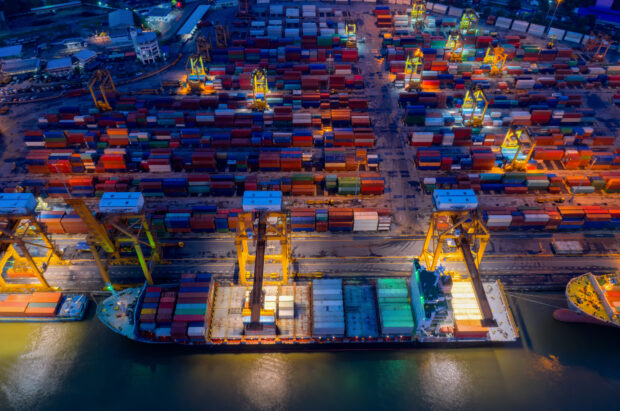Small and medium-sized businesses, which make up a huge portion of freight moved globally, have long struggled with underinsurance because traditional insurance products just have not met their specific needs, according to the founder and CEO of Loadsure, the pay-as-you-go InsurTech managing general agent.
Executive Summary
The CEO of InsurTech Loadsure had years of experience as a freight and logistics broker in the London market, which gave him unique insight into how technology could help fill the insurance protection gap for small and medium-sized freight shippers. SMBs are generally underinsured and underserved by traditional cargo insurance, but Johnny McCord aims to change that with his technology-driven startup.After many years working as a freight and logistics broker in the London market, Johnny McCord understood where the freight industry’s “pain points” were and thought technology and artificial intelligence (AI) could solve some of the underinsurance problems facing SMBs.
In an interview with Carrier Management, McCord said he has seen reports that 60 percent to 90 percent of cargo in transit is either underinsured or uninsured, which he calls “a global crisis.”
McCord launched Loadsure in 2018 because he saw a gap in the market that needed filling—an insurance protection gap.
“I’m passionate about solving this problem because SMBs have been forced for too long to buy expensive, annual, one-dimensional products that are focused on the needs of large enterprise companies,” he said, noting that some SMBs run the risk of complete or partial exposure when they rely on the conveyance carrier’s liability policy.
While it is sold as cargo insurance, at the end of the day, the carrier’s liability policy exists to protect the trucking company or the carrier “in the event of their negligence or their liability to the goods that are in their care, custody and control,” McCord said.

These liability policies have many exclusions and pay pennies on the dollar, he explained. “In the event of a claim, [the SMB shipper] has to prove negligence, so it’s a huge problem.”
Many SMBs don’t understand how a liability policy responds when a claim occurs—that they’ll potentially have to wait more than 130 days to prove negligence, he said. Or they might not even get their claims paid if their shipments are commodities that are excluded from the carrier’s policies.
COVID 19, the global geopolitical situation and the Russia-Ukraine war have combined to put huge amounts of stress on the global supply chain, he emphasized. “This instability is adding further unnecessary exposure to the goods that are in transit, and these are the goods that we rely on every day.”
Low-Complexity Risk
The genesis of Loadsure started with the years that McCord spent as a freight and logistics broker when he realized that a lot of this business is volume transactional business, or what the insurance industry calls “low-complexity risk.” He also saw that the insurance value chain was “touching” the business too frequently—adding unnecessary acquisition costs to the cost of risk.
“I started to realize that this sector of the freight industry was becoming underserved, and that’s how the concept of Loadsure evolved,” McCord said. “I realized how the digital freight infrastructure could allow us to distribute AI-powered, pay-as-you-go freight insurance, which could be purchased within seconds.”
Insurance brokers, the trusted adviser to the freight industry, had historically viewed change with cynicism, which created a barrier to technological advances—because of the fear of disruption, he said. “However, during the pandemic we saw the commercial insurance market starting to trust technology, letting it in, and understanding that it’s here to support and augment as opposed to purely disrupt and eradicate jobs,” he said, describing the industry’s embrace of technology during COVID-19 lockdowns as the one silver lining.
The timing was right for SMBs and their brokers to accept Loadsure, which McCord describes as the freight industry’s first fully digital native InsurTech MGA. By “digitally native,” McCord means that the company was born as a tech company that “doesn’t want to physically touch the issuance and underwriting of insurance policies.”
“We’re not here currently to focus on large, complex accounts,” he said.
Loadsure’s technology is driven by artificial intelligence, which McCord said is previously untapped data from the shipping industry. Hundreds of different models are regularly built, while real-time visibility data is captured “to provide a clear risk profile with unprecedented granularity.”
“We very proudly say that we’ve probably created the most advanced freight insurance machine learning rating algorithm in the world,” with more than 500 different rating attributes, McCord said.
Loadsure only underwrites container movements and doesn’t insure bulk shipments.
Risks are underwritten using a large number of rating attributes, including the shipment’s duration and a per shipment commodity basis, factoring in less than truckload (LTL) or full container load (FCL) considerations.
“We are able to provide a true rate at the shipment level, as opposed to the traditional markets that are using inflated rates because they aren’t able to see the insureds’ full risk profiles as we are able to do.”
Building Customer Relationships
McCord said insurance is here to protect industries, so we are looking at ways to bring the cost of insurance down. “Obviously, it’s very important that we do know our customers. When you’re providing a transactional embedded insurance solution, you don’t necessarily know your customer until you start to build a relationship with them.” The technology Loadsure employs helps to build the customers’ risk profiles.
Via an application programming interface (API), Loadsure can connect directly into the transportation management systems or workflows of shippers, intermediaries, freight forwarders, or even with the shipping or trucking companies.
 “We analyze where that commodity is, where it’s going to and from, who the carrier is and what mode of conveyance will be used. Then in real time, under a second, we’ll send back a quote, which can be purchased there and then within the workflow,” he continued.
“We analyze where that commodity is, where it’s going to and from, who the carrier is and what mode of conveyance will be used. Then in real time, under a second, we’ll send back a quote, which can be purchased there and then within the workflow,” he continued.
“Our technology then distributes the certificates of insurance, and that load or shipment is fully covered for full invoice value.”
“A lot of behind-the-scenes analytics is going on to enable us to know our customer better from the very first connection. The better our relationship, the more our product is purchased and the better that they perform. We can then deliver our promise of being far more cost effective than the traditional insurance industry on a transactional basis.”
Holistic Freight Protection
McCord emphasized that Loadsure’s technology is not used just for risk transfer but also as a “holistic freight protection.” By continuously providing insights on clients’ risk exposure, Loadsure can help insureds make better decisions and ultimately try and mitigate losses from occurring in the first place, he said.
“We actually believe that the active risk management piece will become more important than the insurance paper that we’re issuing. Those policies will always have to be issued, and we’re not saying that you can remove that, but they would be there to protect against that unforeseen catastrophe.”
The Loadsure ecosystem will minimize the chances of insureds being affected by the ever-growing risk of losses, he said. “We’re providing the industry with far more actionable data, guiding reports and just-in-time suggestions to reduce those losses and then continuously reward the insureds.”
He explained that this creates a rating cycle, which enables Loadsure to provide better pricing and then ultimately help to protect the supply chain.
McCord cited one example the company experienced with clients in the U.S.—meat haulers that had started to report “mysterious disappearances of truckloads of beef.”
“We were able to jump into that pretty quickly with our active risk management to mitigate the loss,” he said. While the trucks had tracking devices, the drivers, who were involved with the thefts, were able to turn off these transponders and no one had any idea where the shipments had gone. As a result, Loadsure requested that the shipper place a very inexpensive, hidden Internet of Things (IoT) device in the trailers when they were loaded.
“Whilst the loss still occurred, we were able to recover that shipment very quickly because we were able to provide law enforcement with the location of the trailer.”
As a result of this action, McCord said that Loadsure didn’t implement a rate rise for the client, which took some actionable steps to mitigate future losses through better protocols at the shipper’s yard. While he didn’t want to provide details, it was later determined that some of the drivers were working for crime syndicates.
Products
The company’s go-to-market product was the physical loss or damage to cargo, but it has a number of additional products that soon will be rolled out, including one for liability.
In May this year, the company launched an annual cargo product, called “Danube (Dynamic Ocean Cargo Insurance),” which aims to deliver the financial convenience of a pay-as-you-go policy with the assurance that annual cover provides. Cargo Plus is offered worldwide and includes all-risk coverage for goods and merchandise in transit, with limits of up to $10 million in international and $5 million in the U.S.
What’s Ahead
Since London-based Loadsure launched in 2018, it has raised about $15 million, including a Series A funding round of $11 million in March 2022.
A Lloyd’s coverholder, McCord’s goal for Loadsure is to become the next InsurTech unicorn with more than a $1 billion valuation. “We’re looking to grow three-and-a-half times year on year, so we’ve got some pretty hefty targets. In five years’ time, we want to be writing more than $1 billion in premium through our efficiencies and through our technology.”
Would McCord prefer that Loadsure remain independent, or could an acquisition be in the cards?
“Going through the fundraising journey, I got asked that a lot. Let me just say: I’m enjoying this journey that I’m on and you never know what’s around the next corner. I will do what I can to reach our goals, and I’m sure there’ll be some interesting decisions to be made along that journey. All opportunities will be considered.”





















 Nearly 26.2M Workers Are Expected to Miss Work on Super Bowl Monday
Nearly 26.2M Workers Are Expected to Miss Work on Super Bowl Monday  Berkshire-owned Utility Urges Oregon Appeals Court to Limit Wildfire Damages
Berkshire-owned Utility Urges Oregon Appeals Court to Limit Wildfire Damages  How Americans Are Using AI at Work: Gallup Poll
How Americans Are Using AI at Work: Gallup Poll  Experts Say It’s Difficult to Tie AI to Layoffs
Experts Say It’s Difficult to Tie AI to Layoffs 







